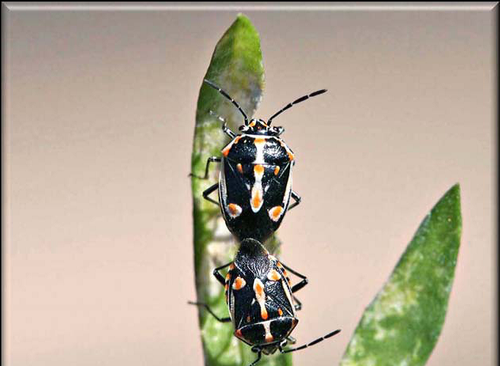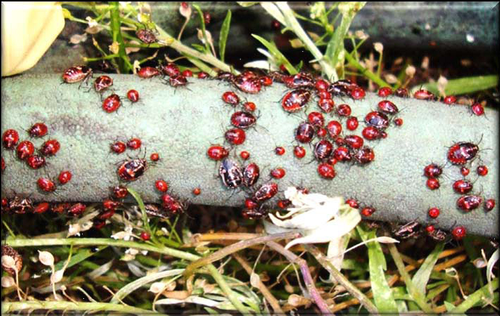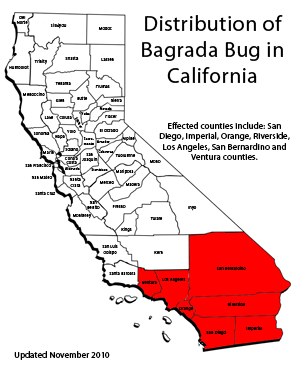Bagrada Bug Now Found in Southern California
In a recent newsletter of the Western Plant Diagnostic Network, (WPDN) for First Detectors, a new pest of California was highlighted. This pest is the Bagrada Bug, Bagrada hilaris, Burmester 1835, Order Hemiptera, family Pentatomidae. Following is the text and a few pictures from the newsletter. The article was written by Richard, Hoenisch, Editor of WPDN First Detector Network.
The Bagrada Bug is a species of shield bug known by the common names bagrada bug, painted bug, and harlequin bug. It is native to much of eastern and southern Africa and parts of southern Europe and Asia. It is now known in CA and AZ, where it was first reported in 2008. It is a major pest insect of Brassica oleracea crops, including cabbage, kale, cauliflower, Brussels sprouts, and broccoli, and related crucifers such as turnips, rape, and mustard. The adult and nymph of the species suck sap from the leaves of the plants, causing wilting, yellowing, and stunting of growth. Please see The Bagrada bug, a New Invasive Pest of Cole Crops in Arizona for a view of the damage. Besides crucifers, the bugs are known on papaya, sorghum, maize, potato, cotton, caper, pearl millet, and some legumes. Large numbers of the bug congregate on the plants and cause extensive damage. The adult bug is 5 to 7 millimeters in length, shield-shaped, and black with white and orange markings. The female, which is larger than the male, lays up to 100 oval or barrel-shaped eggs on leaves or in soil beneath plants. The eggs are white when freshly deposited and turn orange over time. Within 8 days the first-instar nymph emerges. It is bright orange-red and turns darker as it develops, becoming mostly or predominantly black by the last instar. The bug made a sudden appearance in Los Angeles in June, 2008, its first sighting in the Western Hemisphere. It then moved into the cropland of the heavily agricultural Coachella and Imperial Valleys of California, doing damage to cole crops there, especially those grown organically. Dr. Gevork Arakelian, entomologist for Los Angeles County, says this insect has the potential to become a very serious pest.
Comments:
2.
I had some last year on my collard greens, and I spotted a few this year. Soapy water got rid of them before an infestation.
3.
I had a serious infestation on turnips & radishes. The type
I saw most closely fit the UC IPM websites photos of Murgantia histrionica. It is in the same Order (Hemiptera) and family (Pentatomidae) as the Bagrada hilaris. I removed the mulch in the bed as suggested on the UC IPM website and was able to control it somewhat. I will plant a few "trap" plants this spring to pick up any eggs that overwintered.
4.
I had an infestation this summer on mustard, then they migrated to the vegetable garden and now I know they love nasturtiums (which I used for beneficial bugs) and found them this morning on a jalapeno pepper plant and they were causing damage to the pepper, mottling and die back of the plant. I've found them on other flowers such as alyssum. Have used insecticidal soap (Dr. Bronner Peppermint) with good success, but they can really take over quickly. Seems like they are very opportunistic.











Posted by Judith Myrick on January 7, 2012 at 7:01 PM